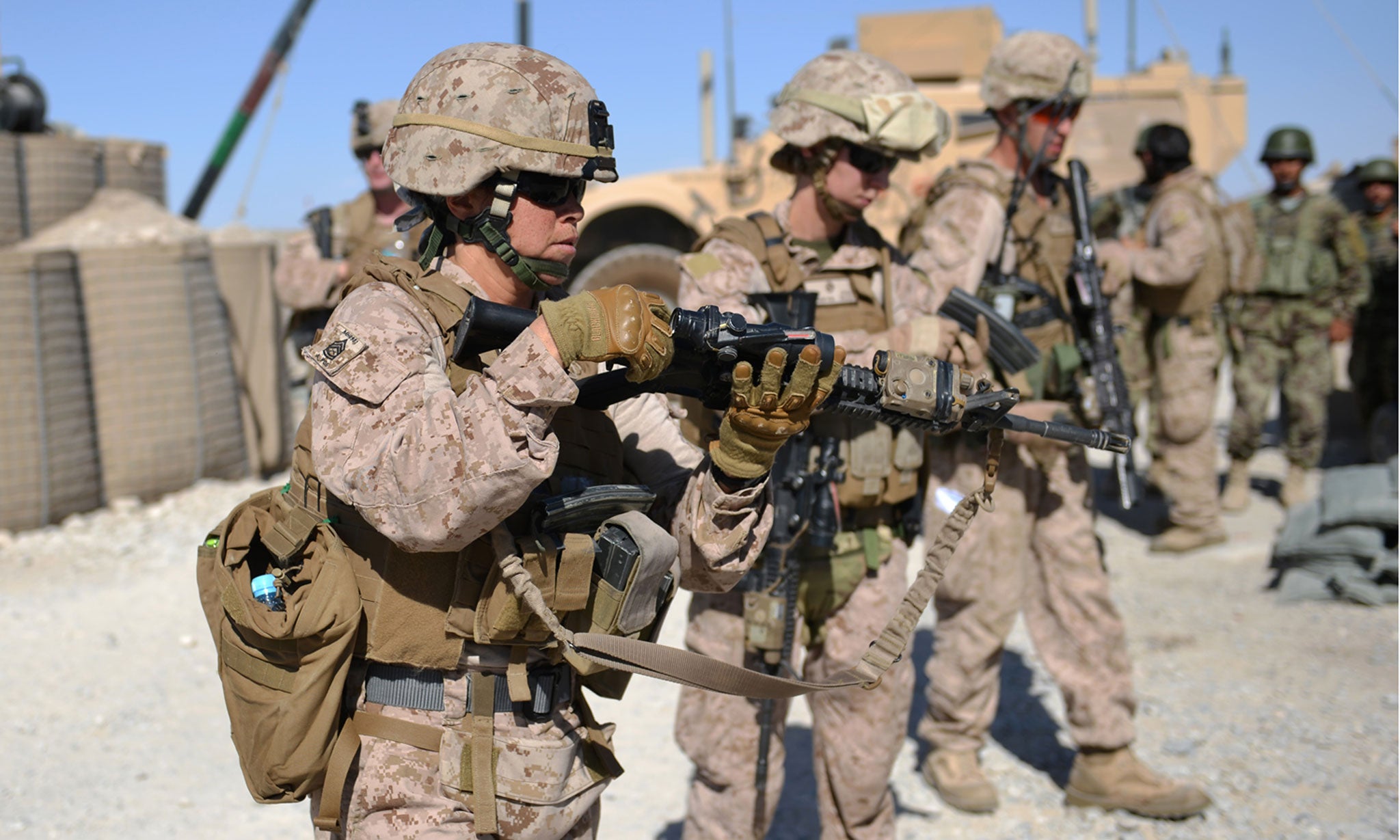Women in combat roles is besides the point. Here's two key steps the US military should take if it really wants to stand up for women worldwide
First, prosecute the rapists within the armed forces


Your support helps us to tell the story
From reproductive rights to climate change to Big Tech, The Independent is on the ground when the story is developing. Whether it's investigating the financials of Elon Musk's pro-Trump PAC or producing our latest documentary, 'The A Word', which shines a light on the American women fighting for reproductive rights, we know how important it is to parse out the facts from the messaging.
At such a critical moment in US history, we need reporters on the ground. Your donation allows us to keep sending journalists to speak to both sides of the story.
The Independent is trusted by Americans across the entire political spectrum. And unlike many other quality news outlets, we choose not to lock Americans out of our reporting and analysis with paywalls. We believe quality journalism should be available to everyone, paid for by those who can afford it.
Your support makes all the difference.Clearly women can fight and kill effectively; that’s not even controversial. It’s the context in which US and potentially British female soldiers will be fighting in which is dubious. Surely female Israeli soldiers have been killing Palestinians, including one would assume Palestinian women, for years, but it’s hardly a sign of liberation.
Obviously in the US or UK such a move would be resisted by old school Stegosaurs in the what are known as the “teeth arms” or combat units and they will point to women being a distraction and affecting cohesiveness. The fact is if men struggle to work alongside women as soldiers, then it’s down to a lack of professionalism on the men’s part. Case closed. But is the American military really trying to convince us that it is a progressive force for women? That claim needs unpacking.
Currently a US servicewoman is more likely to be raped by a colleague than killed by enemy action. 20 per cent of US female service members have been sexually assaulted and of cases brought to court martial a tiny fraction of these result in a conviction. Some estimates reckon on fifty-two assaults per day. Ask yourself if this is can possibly be an institution with the best interests of its female members at heart. How will it be explained? “You are free to kill Afghans now, but watch out for your commander’s wandering hands”
It gets worse. The US military - in which women are apparently routinely raped - was despatched to Central Asia proclaiming, among other things, that it would free women. Rather the occupation has managed make Afghanistan the most – THE MOST - dangerous place on the planet in which to be a woman. Antonella Notari, head of NGO Women Change Makers, has said that the "ongoing conflict, NATO airstrikes and cultural practices combined make Afghanistan a very dangerous place for women" High-fives, Team NATO.
Before anyone tries with the broken-down argument that it’s the insurgents causing violence we should recall that it’s the occupation causing the insurgency. The escalated troop numbers created the fighting, which has had a disproportionate impact on women. Put simply with no occupying forces as a lightning rod for violence Afghanistan would still be dangerous for women, but less dangerous.
Surprising? Not really. As with this new change in rules, we should not fall into the trap of thinking that US internal military policy hinges on women’s needs any more than US foreign policy does. As one military officer pointed out in the Nick Turse-edited book, aptly titled The Case for Withdrawal from Afghanistan, Obama cannot be distracted from the security agenda by the “…trivial plight of women…” Imperialists are no more in the business of saving wee girlies today than they were during Vietnam or the British Raj.
The regime which we have propped up under the dapper Hamid Karzai – a regime with a record on misogyny as damning as the Taliban’s - has passed the controversial Shia Personal Status law, enshrining in legislation the right of a man to starve his wife if she does not concede to his sexual advances. This is the government which coalition soldiers of both sexes have been dying to protect, so you’ll forgive me if I’m not convinced.
It’s reasonable to ask if the British military will follow the model of the US in allowing women to fight. In truth, like in the US, women have been effectively operating in quasi-combat roles for some time and there are already combat-experienced female signallers, drivers, medics and pilots.
While women were routinely discriminated against in the British Army, it genuinely surprised me to find out that there appears to be extremely high number of women suffering sexual harassment. It was found that every servicewoman questioned in a recent survey – whether commissioned or non-commissioned - had been affected.
This shift in US rules seems to be an exercise in shallow PR like that attributed to the movie Zero Dark Thirty. You can imagine the formula: a feisty female spook, a slick operator in a masculine world, wherein equality is the opportunity for a woman to show she can tee up torture and extrajudicial killing as well as the next man.
Simply, the military will have to do more than officially let women shoot women to recover from its monumental list of feminism fails. Though it might be too late, here’s a 2-point plan for Obama if he wants to leave a genuine liberal legacy for women.
Number one: prosecute rapists.
Number Two: stop prosecuting wars.
Join our commenting forum
Join thought-provoking conversations, follow other Independent readers and see their replies
Comments